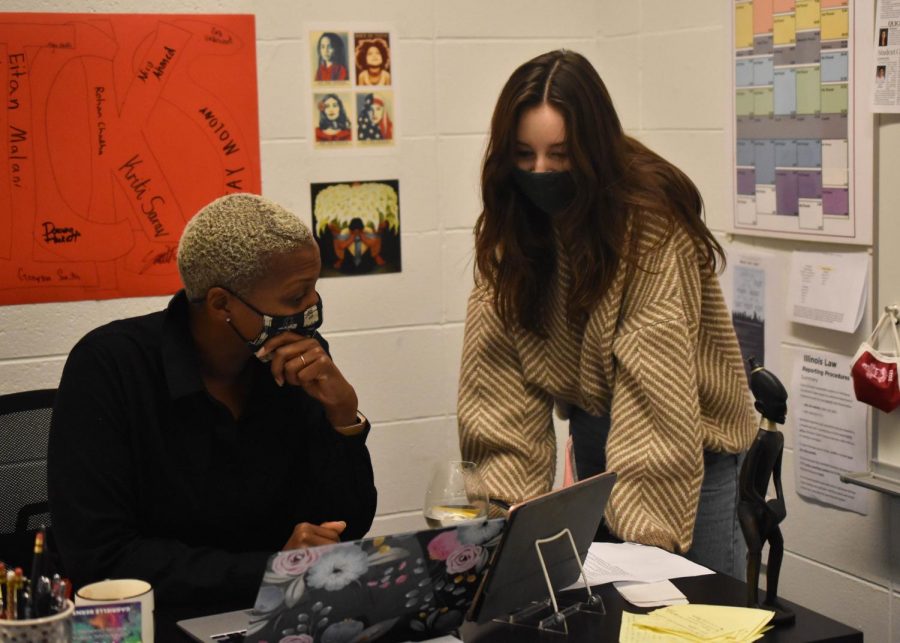Students seek spaces to discuss accommodations
Learning Coordinator Heavenly Hicks and Ashley Hannah discuss accommodations.
November 10, 2021
One in five students receive learning accommodations at Lab, corresponding with the national rate of children with learning differences in the broader United States. At the tail-end of Learning Disabilities Awareness Month, some U-High students are seeking spaces to talk openly about their experiences, and to acknowledge that having a learning difference or disability at U-High is more common than many would expect.
Senior Ashley Hannah started receiving learning accommodations in ninth grade. She now receives extra time for reading-based assessments in classes but stresses that it can still be frustrating to get through readings when they take a long time.
“It can be challenging sometimes in classes where you need to read more — like English and history — because there’s not really anything you can do because it just takes longer,” Ashley said.
Ashley said that the process of receiving accommodations is extensive as well. According to high school learning coordinator Laura Doto, many aren’t familiar with the legal documentation and complexities behind becoming eligible to receive accommodations.
“It can be challenging. My counselors dealt with a lot of it, which is helpful,” Ashley said. “But I had to go to a day-long testing to figure out why I needed accommodations.”
After qualifying for accommodations, the responsibilities of the students don’t always completely end. Even though teachers are responsible for remembering student accommodations, Junior Myla Allen often reminds her teachers before any event that might require them.
“I’ve had accommodations ever since lower school, when I found out I had a learning difference,” Myla said. “Basically, how it works is the teachers have a document with what my accommodations are, and I also have to remind the teacher of them before a test.”
While the majority of students at U-High do not choose to participate in student groups related to their accommodations, some students, such as freshman Katie Schmidt, turn to clubs that discuss learning differences and disabilities.
Katie is the vice president of the Students with Disabilities Association.
“We try to create a space where, if you want to speak about your disability, then you can,” Katie said. “If you don’t want to, then that’s a personal thing and you don’t have to.”
As Katie sees it, what makes the club valuable is not defining people by their disability when they walk through the door, but acknowledging that disabilities affect many students within the U-High community — more than most know of.
Katie believes this mentality should be applied to classrooms.
“Personally, I don’t think anybody should be forced to disclose if they have a disability or different accommodations because that’s personal information,” Katie said. “They choose when to disclose that information because it’s theirs.”
There is also a community of people who do not have disabilities and still show up to the Students with Disabilities Association — something Katie thinks is particularly important.
“Genuinely I think it’s great to have people that are allies in the club,” Katie said. “A lot of people don’t know these things. We need to educate more people.”
With such a large community of U-High students with learning differences or disabilities, it’s valuable for all Lab students to learn about the experiences of their fellow peers.
“Nobody has a full understanding of, you know, every single disability and what it’s like,” Katie said. “It’s a learning process.”
































































Elaine • Nov 10, 2021 at 6:15 pm
This is an excellent piece and bring light to a topic that needs and deserves attention and more discussion!!
Bravo! Bravo!!
Here is to a more diverse and inclusive world!!